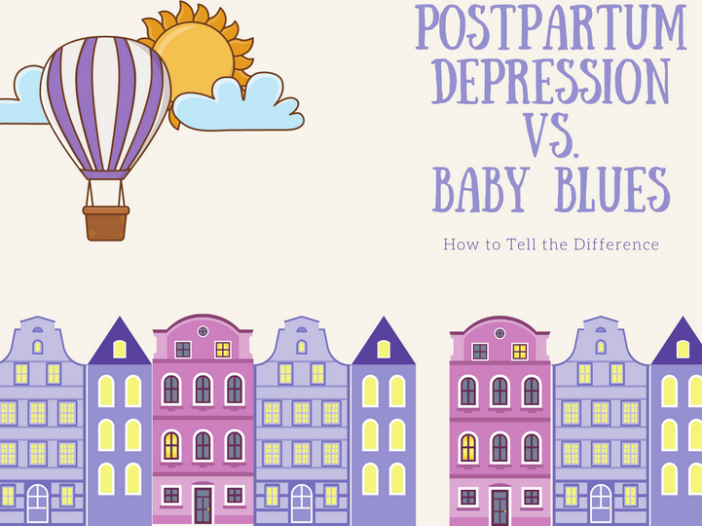Have you ever wondered if your baby blues is more than just the blues? Read on to find out how to tell the difference between postpartum depression or baby blues.

As a brand new mother, I remember having so many ups and downs in my emotions. I would cry because my son was so beautiful. I was happy, tired and just wanted to sleep all at the same time. My midwife assured me that I had what is called “baby blues.” If you have read my story then you know that my up and down emotions developed into much more than a bit of baby blues.
What is baby blues?
If you are a new parent, you may feel a range of emotions in the first few weeks. There is no need for alarm just yet. Baby blues has symptoms including crying for no reason (or all the reasons), feeling unlike yourself, irritability and impatience, anxiety, and poor concentration. This is due to the lack of sleep experienced and the changing hormones as your body transitions out of pregnancy.
How is postpartum depression different from baby blues?
Postpartum depression happens beyond the first few weeks and can hit or progress for up to a year after the baby is born. I have known quite a few mothers who didn’t realise they had postpartum depression. Since they weren’t treated, it hit them hard after the baby turned 1. I am included in this. Looking back, I’m certain that I had postpartum depression and anxiety after my eldest was born. I didn’t recognise it until my second child was close to a year old. By then, my symptoms were terribly bad.
So how do you know when your symptoms are baby blues or whether they have progressed into postpartum depression?
I think a good deal of getting a diagnosis is having the self awareness to know whether or not you need help or not. Many times, postpartum depression goes undiagnosed because new mothers don’t have the time to sit and reflect for very long. Oftentimes, doctors and well-meaning friends and family tell mothers that they just have baby blues and should be fine with a bit of this or that (whatever they think will help). Let me just take a moment to be your friend that tells you that if you are still struggling a month or more after your newborn’s birth, talking to someone may be your best option. Talking to your GP, a counsellor, or a help line, can rule out more serious problems in the very least and get you the community and help you need to begin healing.

Help and Support
Postpartum Support International
Related Posts
Do Dads Get Postpartum Depression?

[…] It dawned on me that if we don’t share our lives with each other, then we won’t realise what’s normal, that we’re not alone, and that we can have the “tribe” we always read about […]